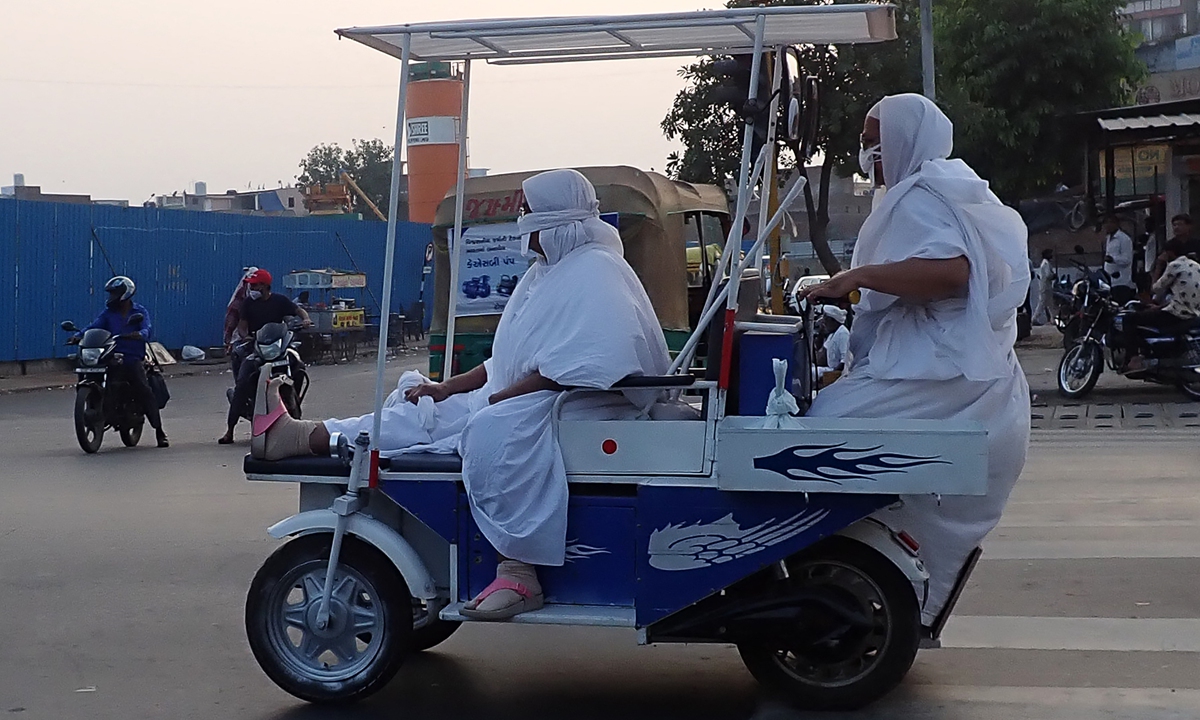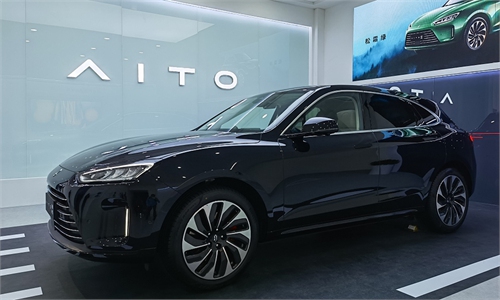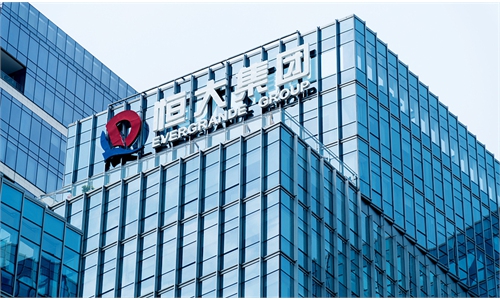
Jain monks (in white robes) ride on an electric vehicle along a street in Ahmedabad, India on November 20, 2021. Photo: AFP
Pratibha Kumbhar, a 35-year-old mother of two, is making up for lost time.Trained in soldering, she aspired to a career in electrical work but hemmed saris for her husband's tailor shop in the west Indian city of Pune until two years ago, when she found work in the country's fast-expanding electric vehicle (EV) sector.
Kumbhar's ambition, stalled by motherhood and safety worries about working in a roadside electrical shop, has now taken wings as she assembles circuits for EV speedometers at a factory in Pune - her first job as a formal worker with fixed wages.
She is one of a small but growing group of women blazing a trail amid India's EV boom, driven by record sales and a policy push, as the government seeks to cut planet-heating emissions by promoting the use of electric scooters, rickshaws and cars run on power that is set to become increasingly clean over time.
Despite concerns over safety and quality, as well as a shortage of charging stations, demand for EVs is outstripping supply - and as firms ramp up production, they are offering rare jobs to women in an auto industry that has been male-dominated.
"I work fixed hours and I am financially independent," said Kumbhar, assembling circuits with pink-gloved fingers on an all-female shop-floor at Kinetic Communications, a manufacturer of EV components and a subsidiary of Indian auto-maker Kinetic Group. "My soldering is good and I may get a promotion. This was my dream."
The factory's workforce is about four-fifths women, which goes against the grain in India, where only 20 percent of women are in the labor force.
The South Asian nation has one of the world's lowest female participation rates, far below the global average of 47 percent of women employed or seeking a job compared with 74 percent of men.
The COVID-19 pandemic exacerbated India's gender gap, as nearly half of women lost their jobs across the formal and informal sectors during lockdowns and had not returned to work by the end of 2020, research shows.
Yet in the past two years, as sales of EVs surged by over 200 percent in India and more factories sprang up to produce them, doors have started to open for women in manufacturing, design and leadership roles.
In contrast to manufacturing of internal combustion engine vehicles, which relies on heavy machinery, EV companies are focused on electronics, assembly, software and design - skill-sets more widely available among women, industry analysts say.
Labor rights advocates see women's comparative advantage in the EV business as an opportunity to increase their pay and strengthen their status and influence in the workplace.
Rashmi Urdhwareshe, president of the Society of Automotive Engineers, noted that startups in the EV ecosystem are bringing in new ideas and, unlike legacy auto firms with a conventional male workforce, are building their business from scratch.
Ride-hailing firm Ola Cabs and Italian motor manufacturer Piaggio have set up all-women shop-floors at their India-based factories in 2021.
And Kinetic Green and fellow leading EV makers Hero Electric and Ather Energy plan to expand and employ largely women.
Battery-maker Esmito Solutions and EV manufacturing majors Kinetic Green and Mahindra Electric, meanwhile, are helmed by women, as is the federal power ministry's energy transition company.
Urdhwareshe, one of the few women in India's auto industry when she started work in the 1980s, said women have the mindset needed to navigate the challenges of a fledgling business, because they care about safety and value for money.
"But there are not enough women yet, and the few that are there are trend-setting examples," she emphasized.
Breaking bias
Prabhjot Kaur, co-founder and CEO of Esmito, a startup producing batteries and battery-swapping stations for EVs, remembers having to patiently explain her job in meetings where she was often the only woman.
"I would be asked two, three, four times about what I do. I remember the faces and expressions of everyone who assumed I was a secretary, and then saw me take the floor to make my presentation," said the 42-year-old.
Sulajja Firodia Motwani, founder and CEO of Kinetic Green, has also been in Kaur's shoes.
After finishing university and returning from the United States in the mid-1990s, she joined her family's auto business, only to be met with skepticism by staff.
"They thought I was a privileged daughter who was here for a little time and that I would disappear in a few days," said Motwani, 51.
Kaur and Motwani have faced other challenges common to most women in the EV corporate world, from a lack of female toilets to not being taken seriously by colleagues.
More positively, many women leaders and shop-floor workers told the Thomson Reuters Foundation their parents had been their loudest cheerleaders, with fathers especially egging them on to pursue their ambitions.
Born and brought up in Rajpura, a small town in largely agrarian northern Punjab state, Kaur traces her determination back to her desire to hold her own in the karate classes she took as a teenager - the only girl in a class of 50.
Kaur did not want to go, but her father persuaded her.
"I was very angry and it translated into me being the best student," she said. "It also taught me not to fear my surroundings and so I never feared large groups of men."
As a child, Motwani whiled away the hours in her grandfather's office, scribbling away on its walls - but when she came back armed with a degree from Carnegie Mellon University, she still had to prove her worth.
"I have earned my place in the industry... I never took this platform for granted. I was back at work four days after my baby was born," said Motwani, sitting in the same office.
In her early days, she traveled across 200 districts to get to know the firm's dealership network. But it is not just female CEOs who are helping steer India's EV surge - there are also thousands of women factory workers.
Reuters



